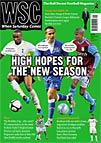 Gavin Willacy looks forward to the Premier League debuts of two of Burnley's thirtysomethings – better late than never
Gavin Willacy looks forward to the Premier League debuts of two of Burnley's thirtysomethings – better late than never
When Burnley make their return to top-flight football after 33 years, two of their most important players will be making their Premier League debuts in the 30s. Graham Alexander, who captained the side at Wembley in May, is approaching his 38th birthday, and Wade Elliott, the midfielder who scored the winning goal against Sheffield United, will be 30. They have both come a long way.